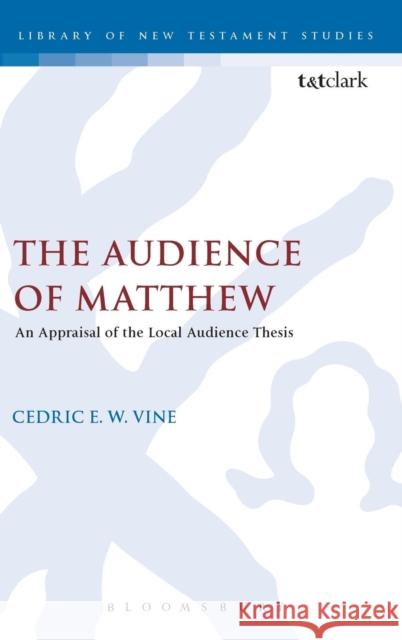The Audience of Matthew: An Appraisal of the Local Audience Thesis » książka
The Audience of Matthew: An Appraisal of the Local Audience Thesis
ISBN-13: 9780567421739 / Angielski / Twarda / 2014 / 256 str.
The Audience of Matthew: An Appraisal of the Local Audience Thesis
ISBN-13: 9780567421739 / Angielski / Twarda / 2014 / 256 str.
(netto: 672,10 VAT: 5%)
Najniższa cena z 30 dni: 698,88 zł
ok. 30 dni roboczych.
Darmowa dostawa!
This book seeks to establish the inadequacy of readings of the Gospel of Matthew as intended for, and a reflection of, a local audience or community. Despite repeated challenges, the local audience thesis continues to dominate a large proportion of Matthean scholarship, and, as such, the issue of determining the Gospel's audience remains an open question. This book posits four main critiques. First, the assumptions which underpin the text-focused process of identifying the Gospel's audience, whether deemed to be local, Jewish, or universal, lack clarity. Literary entities such as the implied reader, the intended reader, or the authorial audience, prove inadequate as a means of identifying the Gospel's audience. Second, local audience readings necessarily exclude plot-related developments and are both selective and restrictive in their treatment of characterisation. Much is lost or ignored, as a coherent and simplified audience context is derived from the complex narrative world of the Gospel. Third, this book argues that many in an audience of the Gospel would have incorporated their experience of hearing Matthew within pre-existing mental representations shaped by Mark or other early traditions. Thus, they would have understood the Gospel as relating to events and settings distinct from their own context, regardless of the degree to which they identified with characters or events in the Gospel. Fourth, this book argues that early Christian audiences were largely heterogeneous in terms of ethnicity, age, sex, wealth, familiarity with Christian traditions, and levels of commitment. As such, the aural reception of the Gospel would have resulted in a variety of impacts. A number of these critiques extend beyond the local audience option and for this reason this thesis does not posit a particular audience for the Gospel.












